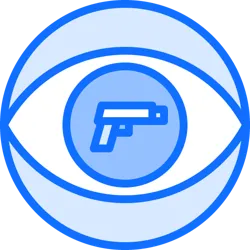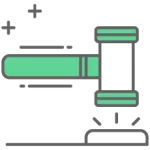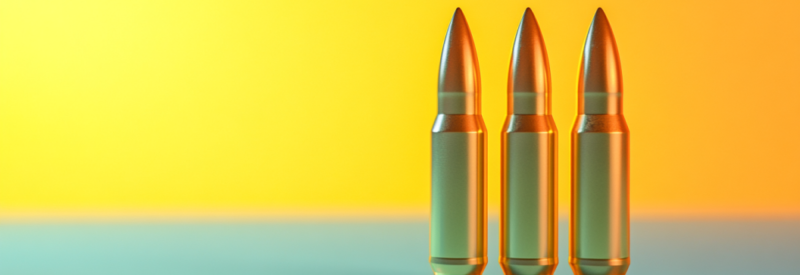TABLE OF CONTENTS
- Getting an Illinois FFL: An Introduction
- Step 1: Meet All of the FFL Requirements
- Step 2: Select the Type of FFL you Need
- Step 3: Complete an Online FFL Course
- Step 4: Apply for your Illinois FFL
- FFL License Costs in Illinois
- Step 5: Have an Interview with a Representative from Your Regional ATF Office
- Getting a Federal Firearms License in Illinois: Closing Thoughts
- FFL Illinois FAQs

If you are thinking about getting into the gun industry while living in the state of Illinois, the first thing you’ll need to learn is how to get a Federal Firearms License (FFL). It’s no secret that Illinois has some strict gun laws and regulations when compared to other states. This can make getting an FFL in Illinois quite difficult.
Many believe obtaining an FFL is difficult; however, it doesn’t have to be with the right guidance. In this article, we’ll examine Illinois FFL requirements, the average FFL license cost in Illinois, and everything you should know about getting an FFL in Illinois.
Getting an Illinois FFL: An Introduction
Before we discuss how to get an FFL in Illinois, let’s define what an FFL is:
A Federal Firearms License, or FFL, is a license issued by the Bureau of Alcohol, Tobacco, Firearms, and Explosives.[1]ATF. “Bureau of Alcohol, Tobacco, Firearms, and Explosives“. Accessed on February 16, 2024. An FFL allows an individual or company to engage in the business of manufacturing, importing, and selling firearms. Note that in Illinois, an FFL is only part of your requirements as a business – you will also need a certification through the State Police.
Step 1: Meet All of the FFL Requirements
When starting a firearms business, you must first make sure you meet all the federal, state, and local FFL requirements. State requirements, as the name implies, vary from state to state (and are quite detailed in Illinois). Additionally, you’ll need to consider your local and zoning regulations. In this section, we will take a detailed look at all requirements to help you determine if you can get an FFL in Illinois.

Federal requirements
To get an FFL in Illinois, you must abide by the same federal requirements as anyone else. These federal requirements are as follows:
- Be at least 21 years old.
- Be a citizen or legal permanent resident of the United States.
- Not have a prior felony conviction.
- Not be a user of federally illegal drugs (this includes marijuana because it’s a federally illegal drug, even though it’s legal at the state level).
- Have no prior conviction for domestic violence.
- Have no prior conviction of any other offense that would disqualify you from owning a gun.
- Not have a formal diagnosis as mentally incompetent.
- Not have violated any federal gun laws.
- Operate out of a physical location, either a home or storefront.
- Meet the requirements for operating an FFL out of your chosen business location.

State requirements
We won’t sugarcoat it. The Illinois FFL requirements are strict. Not only do you have to apply for an FFL in Illinois, but you are also responsible for applying for a Firearms Dealer License Certification (FDLC). This certification comes from the Illinois State Police.[2]ISP. “Illinois State Police”. Accessed on February 16, 2024.
Besides the FFL, you need to apply for your FDLC and meet the following requirements to receive the FDLC and stay licensed. These requirements are as follows:
- Every license holder and employee of a license holder must complete two hours of annual training covering all legal requirements for business operations.
- A business Firearms Owner Identification Card (FOID card) — you must register for this separately.
- Determine whether you plan to operate in a retail or non-retail space.
- Follow all appropriate signage requirements.
- Follow all video surveillance and alarm system requirements (including an alarm system that notifies local law enforcement of “unauthorized intrusion” into any part of the building where you store firearms inventory).
- Maintain a digital record of every firearm that has ever been received or sold by the licensee.
- Have a signed and notarized affidavit certifying the status of your FFL.
- Have all application documents, affidavits, licenses, etc., available in a digital, uploadable format.
*Note: that this is a partial list (and is subject to change) so you should visit the FDLC website and download their checklist for all requirements.

Local and zoning requirements
Navigating local and zoning requirements can prove to be the most challenging obstacle when applying for an FFL. This is no different in the state of Illinois. Illinois seems to change its rules and regulations frequently, so it’s hard to pinpoint what obstacles you may run into. Before applying for an FFL, you will need to contact your local government/police and zoning to ensure you have the authorization to set up a firearms business at your chosen business location.
Step 2: Select the Type of FFL you Need
Before choosing which type of FFL to apply for, you will need to have a solid business model. Are you starting a repair shop or an ammo manufacturing business? Are you looking to ship guns to other businesses around the state? Or maybe you plan to do something else entirely.
There are nine types of FFLs you can apply for, which is why you need to decide what type of firearm business you plan to start before you apply. These nine types of FFLs come in three different categories, (dealers, manufacturers, and importers). Below, we’ll list for you the three categories and the nine types of FFLs within them:

FFL license types
Dealer license types:
- 01 Type FFL: Dealer in firearms other than destructive devices
- 02 Type FFL: Pawnbroker in firearms other than destructive devices
- 09 Type FFL: Dealer in destructive devices
- 03 Type FFL: Collector of curios relics
Manufacturer license types:
- 06 Type FFL: Manufacturer of ammunition for firearms other than ammunition for destructive devices or armor-piercing ammunition
- 07 Type FFL: Manufacturer of firearms other than destructive devices
- 10 Type FFL: Manufacturer of destructive devices, ammunition for destructive devices or armor-piercing ammunition
Importer license types:
- 08 Type FFL: Importer of firearms or ammunition for firearms other than destructive devices or ammunition other than armor-piercing ammunition
- 11 Type FFL: Importer of destructive devices, ammunition for destructive devices or armor-piercing ammunition
Step 3: Complete an Online FFL Course
When becoming an FFL dealer in Illinois, it is not required to complete an online FFL course. The FDLC, however, does require that you complete relevant training. The firearms sector can be risky and controversial, so even without the requirement, we encourage you to take the time to research and become an expert on the industry and its quirks.
Step 4: Apply for your Illinois FFL
Once you have chosen your business model and have ensured that you comply with all federal, state, and local requirements, you should not have any problems getting your FFL and can apply here.
FFL License Costs in Illinois
The FFL license cost in Illinois is based on the federal standard. Below is a chart with all federal costs depending on what type of FFL business you plan to start. All FFL licenses are valid for an initial three years, and each renewal is good for three additional years.
| FFL License | Application Fee | Renewal Fee |
| Type 01 | $200 | $90 |
| Type 02 | $200 | $90 |
| Type 03 | $30 | $30 |
| Type 06 | $30 | $30 |
| Type 07 | $150 | $150 |
| Type 08 | $150 | $150 |
| Type 09 | $3,000 | $3,000 |
| Type 10 | $3,000 | $3,000 |
| Type 11 | $3,000 | $3,000 |

FDLC Fees
In Illinois, the FFL is not the only license you’ll need. You’ll also need to secure an FDLC. The fee for an FDLC operating out of a retail location is $1,200. Non-retail business locations (including some home-based FFLs) have a $300 fee.
Step 5: Have an Interview with a Representative from Your Regional ATF Office
Once you have completed your application and passed the background checks, your regional ATF office in Illinois will arrange an in-person interview with you. The Industry Operations Investigator (IOT) will meet with you to talk about your business and look at your proposed business model, business location (or home location), and verify that you understand the federal laws around selling, importing, or manufacturing guns.[3]ATF. ”How to Become a Federal Firearms Licensee in 10 Easy Steps”. Accessed on February 16, 2024.
Getting a Federal Firearms License in Illinois: Closing Thoughts
Although it might not be the easiest state, getting your FFL in Illinois is possible. We hope that by now, you are familiar with the Illinois FFL requirements and FFL license cost and have a good grasp of how to get an FFL in Illinois.
You will be faced with many more local and state requirements, like obtaining a Firearms Dealer License Certification (FDLC), but if you do your research and stay motivated, you will have your new firearms business up and running in no time. From here, you can secure a gun-friendly merchant service provider to accept payments for your business. A provider that understands the unique challenges of the firearms industry is your best bet in obtaining a merchant account and getting your business started today.
Firearm Businesses Wanted
Your troubles of getting approved for a merchant account are over!
Approval
Rating
FFL Illinois FAQs
Do I need an FFL in Illinois?
Yes. If you plan to start a business in the firearms industry, you will need an FFL in Illinois. Federal regulations require you to have an FFL in all states to be in the firearms industry. However, the federal requirements are considered the bare minimum. Beyond federal regulations, each state can impose its own laws or requirements.
Who can apply for an FFL in Illinois?
Just about any adult can apply for an FFL in Illinois. If you are an American citizen or legal resident, have a clean background, and are at least 21 years of age, you can apply to be an FFL dealer in Illinois.
Do I need to register as a business to get an Illinois FFL?
Yes, federal and local laws require you to register your business entity. When applying for an FFL in Illinois, you’ll need to have a business location secured that meets zoning requirements and a legitimate business plan.
How can I find an FFL dealer in Illinois?
In the state of Illinois, all FFL dealers must register with the Illinois State Police. To find a list of registered FFL dealers in Illinois, simply visit the state police website and search for “FFL dealers.” You can also narrow your search by city or zip code. Once you have found a list of potential dealers, you can contact each one to inquire about their products and services. When choosing an FFL dealer, it is important to consider their reputation, experience, and customer service policies. By taking the time to research your options, you can be sure to find a reputable dealer who can meet your needs.
Can you have a home-based FFL in Illinois?
Yes, you can have a home-based FFL in Illinois. Be sure to double-check your local zoning requirements to avoid the most common hiccup (for example, not being able to operate a firearms business out of an improperly zoned residential location).
Can I apply for an FFL with an Illinois gun trust?
Unfortunately, no. You cannot apply for an FFL with a gun trust. A gun trust is not a person or business, so it is ineligible for an FFL.
Does the BATF&E have requirements for an FFL in Illinois?
Yes. The BATF&E has federal requirements in Illinois and all other 49 states. These requirements are:
- As an FFL holder, you must keep strict and detailed records of all transactions. Each sale of a gun or firearms transfer in Florida must be recorded. The BATF&E may audit your paperwork.
- You also must be at least 21 years old.
- You must have a clean criminal history.
- Your business and the individual applicant must both adhere to the laws of the State of Florida and applicable local or community laws, as well as operate in a secure environment.
- You must be a legal resident of the United States.
- If you have served in the armed forces, you must not have been dishonorably discharged.
- You must not have been a formally diagnosed psychological patient or a user of controlled substances.
Do I need to apply for a SOT for my Illinois FFL?
The answer is that it depends. Based on the types of guns, explosives, or ammunition your business is based around, you may have to apply for a SOT. In Illinois, you will have to apply for an SOT if your business involves any of the following items:
- Silencers
- Machine guns
- Short-barreled rifles
- Short-barreled shotguns
- Destructive devices (explosives)
How long does it take to get your FFL in Illinois?
The process of getting your FFL in Illinois can be rigorous (at least compared to other states). It can be time-consuming to meet all state regulations and even more time-consuming to ensure that you comply with all local and zoning laws. However, once you have submitted your application, you should receive your Illinois FFL in 60 days.
How can I transfer to an FFL in Illinois?
Simply put, you cannot transfer an FFL in Illinois (or in any state). An FFL is issued to an individual for business purposes, not necessarily the business itself. So if you are looking to sell your firearms business or are ready to retire, whoever takes the business over needs to apply for their own FFL.
How much does an FFL transfer cost in Illinois?
If you’re looking to transfer a firearm through a licensed FFL dealer in Illinois, this can cost anywhere from $20 to $200. The FFL transfer rates will vary depending on the weapon or items included in the sale and the FFL dealer you used.
How hard is it to get an FFL in Illinois?
In the scheme of things, Illinois is a tough place to get an FFL. Illinois FFL requirements are more strict than many other states. However, by doing your research and complying with local and state laws, the process is still very achievable.




